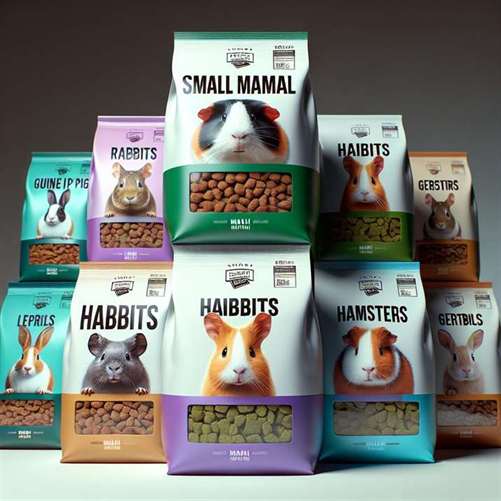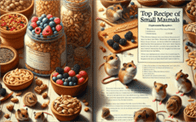What Small Mammal Pet Food Should You Buy
Introduction
Did you know that small mammals like hamsters, guinea pigs, and rabbits are among the fastest-growing categories of pets in households around the world? With their adorable faces and playful personalities, it’s no wonder they capture the hearts of pet lovers everywhere. However, owning a small mammal comes with the responsibility of ensuring their health and well-being, and this starts with understanding their unique dietary needs. Choosing the right small mammal pet food is crucial, as it directly impacts their health, vitality, and longevity.
The significance of high-quality small mammal pet food cannot be overstated. Just as humans require a balanced diet, small mammals also have specific nutritional requirements that must be met for them to thrive. Formulations designed for hamsters, guinea pigs, ferrets, and others are created with their unique dietary needs in mind. Recent studies emphasize the importance of tailored nutrition for various small mammal species, highlighting the need for pet owners to be informed about what they feed their furry friends.
In this comprehensive guide, we will delve into the world of small mammal pet food. You will learn about the different types of food available, the essential ingredients to look for, and practical feeding tips to keep your small mammal happy and healthy. Additionally, we will explore how nutrition affects their well-being and longevity.
Are you ready to discover how to provide the best for your small mammal companion? Explore more on choosing the right pet food and let’s dive in!
What is Small Mammal Pet Food?
Definition
Small mammal pet food is specifically formulated to meet the unique dietary needs of small animals like rabbits, guinea pigs, hamsters, and ferrets. This type of pet food typically includes a blend of high-fiber ingredients, vitamins, and minerals appropriate for each species. The right balance ensures that these pets receive the essential nutrients they need to maintain their health and vitality.
Historical Context
Historically, pet food for small mammals has evolved significantly. In the past, many pet owners relied on homemade diets or generic pet food that did not cater to the specific needs of small mammals. Over the years, as our understanding of animal nutrition has grown, so have the formulations of pet food. Manufacturers now create specific diets tailored to different species, taking into account their natural diets and nutritional requirements. This evolution reflects a growing awareness of the importance of proper nutrition in pet care.
The Importance of Small Mammal Pet Food
Proper nutrition is vital for the health and longevity of small mammals. A balanced diet not only supports their physical health but also contributes to their mental well-being. Common health issues in small mammals, such as obesity, dental problems, and digestive disorders, can often be traced back to inadequate or improper diets. Therefore, it is crucial to choose small mammal pet food that meets their specific needs.
Small Mammal Pet Food in the Context of Veterinary Care
A well-balanced diet can significantly affect health outcomes in small mammals. Regular veterinary check-ups often reveal that many health issues can be mitigated or avoided entirely with proper nutrition. For example, a diet rich in fiber is essential for rabbits and guinea pigs to maintain healthy digestive systems.
Key Players or Contributors
Several brands and organizations play a vital role in shaping the small mammal pet food market. Companies like Oxbow Animal Health and Kaytee have pioneered high-quality diets specifically designed for small mammals, while research organizations continue to study the nutritional needs of these pets.
Learn more about pet nutrition standards and how they impact your pet’s health.

How Does Small Mammal Pet Food Work?
The Mechanics of Small Mammal Pet Food
Understanding how small mammal pet food works involves looking closely at the ingredients. Each component plays a crucial role in providing essential nutrients. For instance, high-fiber hay is a staple for many small mammals, especially rabbits and guinea pigs. It not only aids digestion but also helps wear down their constantly growing teeth.
Other ingredients, such as seeds, grains, and pellets, contribute to a balanced diet but should be used cautiously. They contain more sugars and fats, which can lead to obesity if fed in excess. Therefore, it’s essential to choose a small mammal pet food that has been carefully formulated to provide a balanced diet without unnecessary fillers.
Technological Foundations of Small Mammal Pet Food
Advancements in pet food technology have revolutionized the way we formulate diets for small mammals. Manufacturers now utilize scientific research and nutritional analysis to create food that caters to the specific needs of each species. This includes understanding the differences in digestive systems, energy requirements, and nutrient absorption.
For example, some brands use extrusion technology, which allows for the creation of kibble that retains nutrients better than traditional methods. This not only improves digestibility but also enhances palatability, making it more appealing for pets.
Ingredients to Look For
When selecting small mammal pet food, it’s crucial to read labels carefully. Here are some key ingredients to look for:
- High-quality fibers: Such as hay, which is essential for digestive health.
- Fresh vegetables: Providing vitamins and minerals necessary for overall health.
- Limited sugars and fats: Prevents obesity and dental problems.
- Specific pellets: Designed for the species of your pet, ensuring all nutritional needs are met.
Conversely, avoid foods with high levels of artificial colors or preservatives, as these can be harmful to your pet’s health.
Types of Small Mammal Pet Food
There are several types of small mammal pet food available on the market, each catering to different nutritional needs. Understanding these types can help you make informed decisions for your pet’s diet.
Pelleted Diets
Pelleted diets are among the most common forms of small mammal pet food. They are specifically formulated to provide complete nutrition and are often species-specific. These pellets help prevent selective eating, where pets pick and choose their favorite bits from a mix.
Hay-Based Diets
Hay-based diets are essential for rabbits and guinea pigs. They provide the necessary fiber that supports digestion and dental health. It’s crucial to ensure that your pet has access to unlimited hay daily.
Fresh Foods
Incorporating fresh foods into your pet’s diet is a great way to provide additional nutrients. Leafy greens, vegetables, and occasional fruit can be beneficial. However, it’s essential to research which fresh foods are safe for your specific small mammal.
Treats and Supplements
While treats can be a fun addition to your pet’s diet, moderation is key. Look for healthy treats that are low in sugar and high in fiber. Additionally, supplements may be necessary for specific health concerns, so always consult your veterinarian before adding them.
Feeding Tips for Small Mammals
Feeding your small mammal properly is just as important as choosing the right food. Here are some practical tips to ensure your pet receives optimal nutrition:
- Establish a Routine: Maintain a consistent feeding schedule to help regulate their digestive systems.
- Monitor Portion Sizes: Follow the feeding guidelines provided on the pet food packaging to avoid overfeeding.
- Fresh Water: Always provide fresh water. Dehydration can lead to serious health issues.
- Avoid Sudden Diet Changes: Transition to new foods gradually to prevent digestive upset.
By following these tips, you can help ensure that your small mammal receives a balanced diet that supports their health and happiness.
Future Trends in Small Mammal Pet Food
As the pet food industry continues to evolve, several trends are emerging in the realm of small mammal pet food.
Emphasis on Natural Ingredients
Many pet owners are becoming increasingly aware of the ingredients in their pets’ food. As a result, brands are shifting towards using natural, whole-food ingredients that provide better nutrition without artificial additives.
Customized Nutrition
The trend of personalized pet food is on the rise. Companies are beginning to offer custom formulations based on individual pet needs, taking into account factors like age, weight, and health conditions.
Sustainable Practices
Sustainability is becoming a priority for many consumers. Brands are focusing on sourcing ingredients responsibly and reducing their environmental impact through eco-friendly packaging.
Conclusion
Choosing the right small mammal pet food is essential for ensuring the health and happiness of your furry friends. With a plethora of options available, understanding the nutritional needs of your specific pet is crucial. By selecting high-quality foods and incorporating feeding tips, you can provide your small mammal with a balanced diet that promotes longevity and vitality.
As trends in pet nutrition continue to evolve, staying informed will help you make the best choices for your pet’s needs. Whether you have a playful hamster, a cuddly guinea pig, or an adventurous ferret, the right food will make all the difference.
Remember, a happy pet starts with proper nutrition. Check out our complete guide to small mammal pet care to further enhance your pet ownership experience!
Resource Links:
- petco.com: Small Animal Food · Higgins Sunburst Gourmet Guinea Pig Food Mix. + More Choices Available · Higgins Sunburst Gourmet Food Mix for Hamsters …
- oxbowanimalhealth.com: Oxbow Animal Health provide supplies, food, and care guide for rabbits, guinea pigs, chinchillas, gerbils, hamsters, rats and mice. Shop today.
- shop.smallpetselect.com: Premium Timothy hay for small pets. The best timothy hay based rabbit food and guinea pig food, safe pet bedding, and handmade toys for rabbits and guinea …




0 Comments